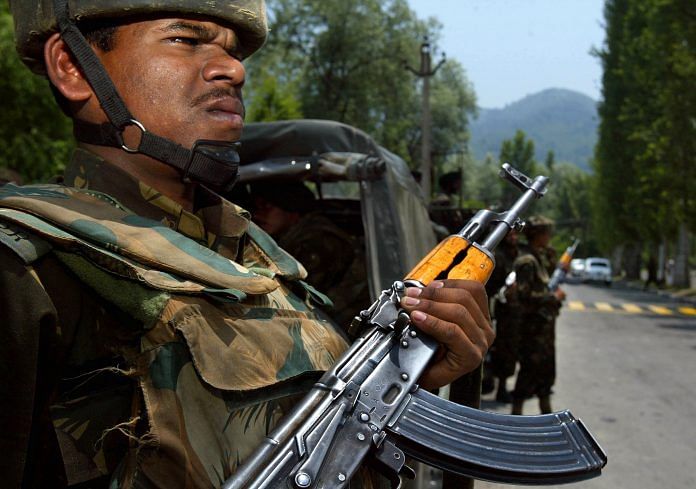AFSPA doesn’t provide legal cover to troops indulging in rape, loot or any such headline-making activity.
As 350 Indian Army soldiers petitioned the Supreme Court not to dilute the Armed Forces Special Powers Act (AFSPA), it is important to understand how it came into force in India. It was not created to give immunity to the Indian military to kill.
The legal process and constitutional provisions dictate that only an officer of the level of sub-divisional magistrate (SDM) or above can give written orders for the Army to open fire at an unruly mob or armed civilians disturbing peace. But it is impossible, and illogical, for the SDM to be present at all times when bullets are likely to fly in an insurgency or terrorism-affected area. And bullets can fly at any time, such is the unpredictable nature of an insurgency.
This was the context in which the Armed Forces Special Powers Act (AFSPA) came into being in the late 1950s due to insurgencies in northeast India. It was later extended to Jammu and Kashmir in 1990, to legally equip the Army against the menace of terrorism.
Also read: What Kautilya would have prescribed for the Kashmir problem
AFSPA is always in the news, with battle lines being drawn rather sharply. The debate is extremely polarised, but that is the nature of political polemics in India. Those against AFSPA raise it every once in a while to suit their electoral requirements. It is an issue that raises temperatures. Those supporting it, especially in uniforms, need it because they know the legal framework under which it allows them to operate. And the non-uniformed supporters of AFSPA need it to keep up their campaign against those they consider insufficiently patriotic.
The truth is that AFSPA is simply an enabling act. It works to allow the Army to operate in an area it has been called into, conduct operations, and open fire, if required, to control the situation. In crowd-control situations, there are strict standard operating procedures in terms of how fire is to be used, like below the knees etc. In an insurgency situation, the Army doesn’t have that luxury.
Constitutionally, tackling insurgencies is the task of the civil and police administrations. But since our Independence, India has depended on its Army for tackling various insurgencies for the simple reason that the Army has the capacity, leadership, ethos, and cohesion to handle the continued stress that an insurgency imposes.
The Army can, and will, only operate in an area covered by AFSPA. Various districts of a state are covered by AFSPA since any insurgency covers a vast area of an affected state. An insurgent could, theoretically and legally, engage the Army in a firefight in a particular district/tehsil and move into the adjoining area if it wasn’t covered by AFSPA, thus preventing troops from chasing him. That is why it is impossible to penny pick which area to keep out of AFSPA.
It must be remembered at all times that AFSPA doesn’t allow the Army to rape or cover any other violation of civil law.
Also read: Why an Indian Army Major can’t just meet a woman at a hotel anywhere
Contrary to what the naysayers would like the country to believe, AFSPA doesn’t provide legal cover to troops engaged in counter-insurgency operations from indulging in rape, loot or any such headline-making activity.
Any military violator of CrPC/IPC can be brought to book, and there have been many instances where they have been.
In the 1990s, there was the famous case of the ‘Ketchup colonel’ who used to fake encounters in Kashmir to get gallantry awards. He made poor shepherds pose as corpses, smeared ketchup on them and accused them of being terrorists. He was convicted under the CrPC.
Crime, even under an AFSPA area, remains a crime and doesn’t get covered up.
A jawan who had raped a Kashmiri civilian in Anantnag district in the 1990s was tried and sentenced within three months. Any allegation of rape is tried under the field law of the Army and the officer or soldier can be court-martialed faster than any conviction in a civil crime.
Also read: After Meghalaya, govt must listen to people, repeal AFSPA in Nagaland & Manipur too
The various officers convicted of fake encounters are an example that AFSPA doesn’t sanction violations of law. It simply enables troops to open fire without requiring a signed document from the SDM. Those living in districts know how long SDMs take to sign documents, and if that was the case in an insurgency, the terrorists would have escaped from the site of action.
During military training, the condition under which the civilian authority brings in the Army to tackle disturbances is a subject that is taught and tested. Promotion exams for military officers have sections that deal with the Army and the conditions under which it can open fire on unarmed or armed people, such as terrorists and insurgents. The exam also includes specific questions on AFSPA, its origins, what it means, why it was instituted as an act and the areas where it is in force. This illustrates that our armed forces are not oblivious to the gravity of law and the limitations that the law imposes on their activities.
Manvendra Singh is editor-in-chief of Defence & Security Alert. He is presently a BJP MLA in the Rajasthan assembly and former member of the Parliament Standing Committee on Defence.




The article is presenting one sided bised view. Completely infnoredbthe fact that permission from central government is required to prosecute accused army personnel.The state government has sent 50 cases for prosecution sanction against the armed forces personnel under Armed Forces Special Powers Act, 1990 since 2001. However, the Union government has denied the permission in all the cases.The cases include “killing after abduction” “outraging the modesty of a woman”, “the disappearance of civilians, rape, and torture and killing.”